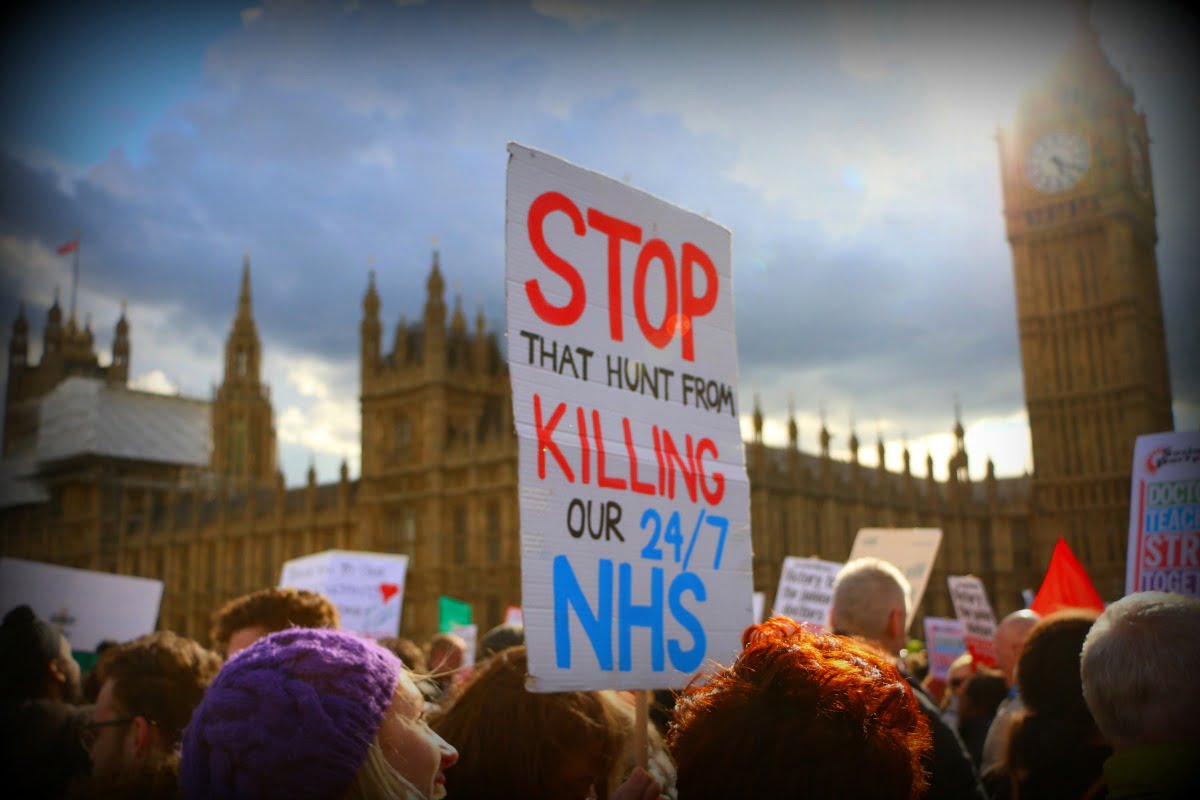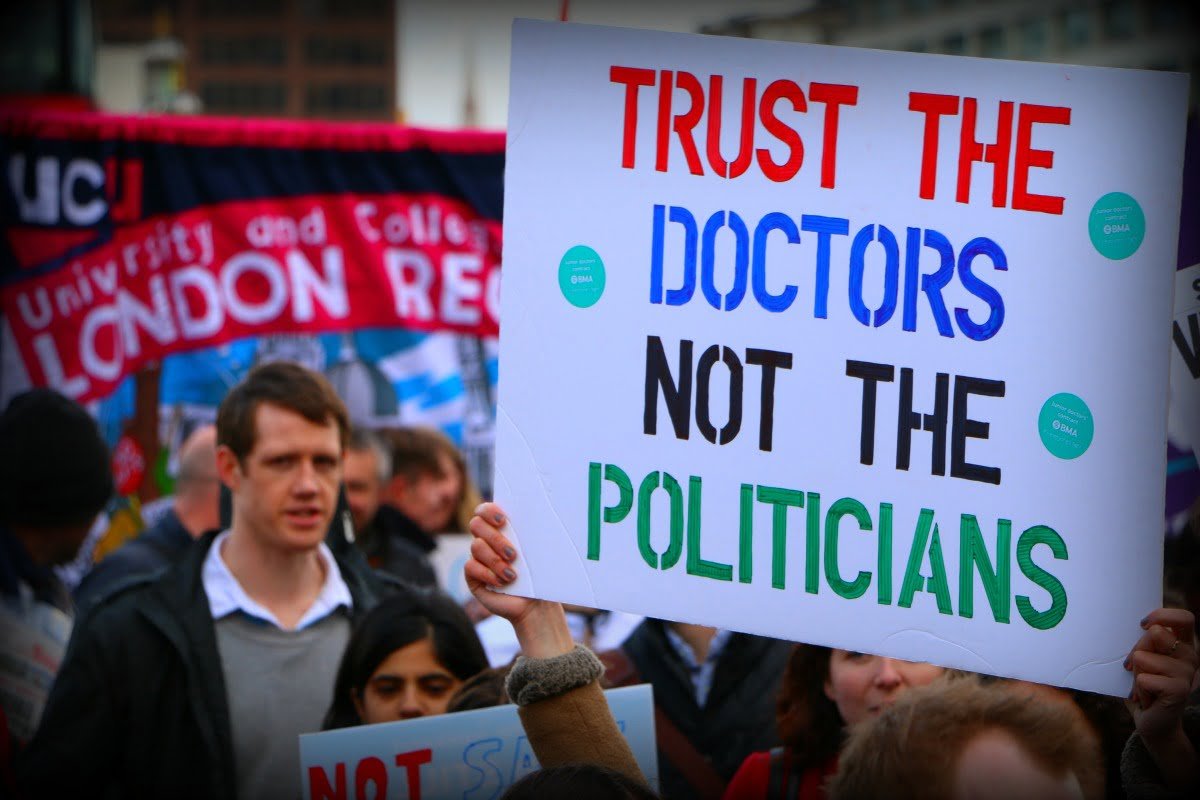Dr Tomasz Pierscionek discusses the deal struck between BMA leaders and the Tory government over the junior doctors’ contract dispute. Whilst the BMA leadership has endorsed the settlement, rank and file members are dubious, with many expressing anger over fears of being sold a shoddy deal. If junior doctors vote to reject the agreement, all bets will be off and the struggle could re-emerge on a higher level.
Dr Tomasz Pierscionek discusses the deal struck between BMA leaders and the Tory government over the junior doctors’ contract dispute. Whilst the BMA leadership has endorsed the settlement, rank and file members are dubious, with many expressing anger over fears of being sold a shoddy deal. If junior doctors vote to reject the agreement, all bets will be off and the struggle could re-emerge on a higher level.
On 18th May, the BMA announced that its negotiating team had reached an agreement on the contents of a new junior doctors’ contact with NHS employers, under the auspices of ACAS (Advisory, Conciliation and Arbitration Service), an organisation promoting arbitration and mediation in disputes between trade unions and employers. The 12-page agreement, which broadly describes areas of agreement between the BMA and the government’s representatives is in the public domain.
In the wake of this announcement, a new contract will be drafted by the end of this month based upon areas of agreement between the two parties. In early June, the BMA’s Junior Doctors Committee (JDC) shall meet and discuss the details of the new contract and its implications for junior doctors, before balloting its 45,000 members on whether or not to accept the terms of the new contract. Voting takes place between the 17th June – 1st July, and results of the ballot will be announced on the 6th July. The JDC is then expected to act according to its members wishes.
The agreement revealed that weekend days shall be paid the same as weekdays, though doctors will receive a pay supplement for working weekends, ranging from 0% for working less than one-eighth of weekends through to 10% for working up to half of weekends. The method of determining a junior doctors basic pay will also change from being based upon length of service to grade attained. Each trust shall also be allocated a guardian to ensure working hours are monitored and trusts fined if these are breached.
The JDC leadership involved in the ACAS negotiations have suggested that the agreement is an improvement upon that proposed by the Department of Health last year. Nevertheless, rank and file doctors are extremely concerned that the deal still falls short of the status quo. The “best you can get” deal is not necessarily the same as a good one. It is clear that strike action has led to an improvement on what doctors were originally offered, and we shall have to wait until a draft of the new contract is published later this month to discover the full implications of the new contract. If junior doctors accept the new contract following next month’s ballot, it is expected to be implemented on a gradual basis, incorporating various groups of doctors between October 2016 and August 2017.
Comments from BMA members on social media, however, reveal an anger amongst junior doctors over the “deal” that has been presented to them. Many consider that they are being sold a shoddy deal by the BMA leadership, and even the BBC has reported that the settlement between the government and the junior doctors could quickly unravel in the face of a rebellion from below. This would pave the way for a renewal of the struggle on a higher level, with the possibility of escalated strike action, and even joint industrial action between junior doctors, NHS staff, and other trade unionists fighting against Tory cuts, such as civil servants, teachers, and lecturers.
Whatever happens next, whether the contract is accepted or rejected, the BMA dispute has brought confidence back into the trade union movement. Doctors, traditionally reticent to engage in politics or ‘rock the boat’ have found themselves rapidly politicised in a baptism of fire and thrust into the front line of defending an NHS that is ever increasingly under threat from privatisation. Over the past several months, the BMA has received huge support from the public and across the trade union movement. Individuals and groups of doctors have, outside of the official capacity of the BMA, forged strong links with other healthcare workers, unions, and the wider labour movement.
The Tories have seen themselves put on the back foot, at a time when the party itself could implode over the EU Referendum. Hunt has been made a fool of time and again, and his claim that we need a seven day service (without the necessary funding and additional staff required for such a venture) because the death rate increases during weekends has been soundly debunked. (It has been shown that as the people attending hospital on weekends are sicker than those who attend during the week, it is unsurprising that there should be a slight difference in death rates).
The mood at this month’s annual BMA junior doctors conference, which was well attended, was upbeat and confident. Conference passed a motion calling on the BMA leadership to “work to foster and develop links with other unions and to lobby the wider BMA to do likewise”. A call for the BMA to seek affiliation to the TUC was sadly defeated – but, the fact that such questions are even being debated indicates there has been a shift in the consciousness of doctors.
The task now is for the TUC to extend out and offer its support and solidarity to the junior doctors in defence of the NHS. The leaders of the labour movement should make a bold call for a one-day general strike against austerity and in defence of all public services, with the aim of bringing down this Tory government. In its place, a Corbyn-led Labour government, armed with a socialist programme, could roll back privatisation in the NHS, nationalise the banks, and use the enormous wealth that exists in society – in the hands of the 1% – to provide a fully-funded public health service. This is the alternative that junior doctors and the entire labour movement must fight for.







